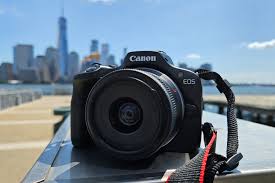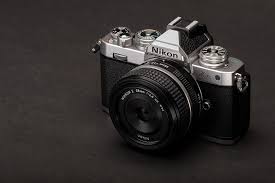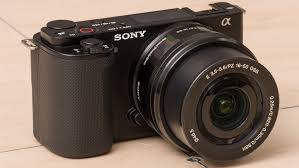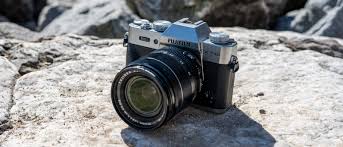Starting your photography journey with the right camera can be the difference between frustration and inspiration. The best beginner cameras empower you to learn and grow without overwhelming you with complexity.
The camera market today offers a wide range of options, from mirrorless to DSLR, vlogging cameras to hybrid models—all tailored to various experience levels and use cases. With brands like Canon, Sony, Nikon, and Fujifilm stepping up innovation, there’s never been a better time to start learning photography.
In this article, you’ll discover the best beginner cameras in 2025.
Top 7 Beginner Cameras in 2025
Whether you’re diving into photography, starting a YouTube channel, or just want better travel photos, choosing the right camera can accelerate your learning and improve your results from day one.
Here’s a curated list of the best beginner cameras in 2025 to match different budgets, styles, and goals.
1. Canon EOS R100
Best For: General photography and learning the basics
Price: ~$479 (with kit lens)

Features:
- 24MP APS-C sensor
- Dual Pixel autofocus
- 4K video recording
Pros:
- Beginner-friendly interface
- Lightweight and easy to handle
Cons:
- Fewer compatible lenses (RF-mount)
2. Olympus OM-D E-M10 Mark IV
Best For: Travel photography and vlogging
Price: ~$699 (with kit lens)

TechRadar
Features:
- 20MP Micro Four Thirds sensor
- In-body image stabilization
- Flip-down touchscreen
Pros:
- Compact and stylish
- Great image quality and stabilization
Cons:
- Smaller sensor than APS-C
3. Nikon Z fc
Best For: Fashion-conscious beginners & retro design lovers
Price: ~$959 (with kit lens)

Features:
- 20.9MP APS-C sensor
- Retro design
- 4K UHD video
Pros:
- Stunning vintage aesthetics
- Sharp images and video
Cons:
- On the higher end for beginners
4. Canon EOS Rebel SL3 / EOS 250D
Best For: Traditional DSLR learners
Price: ~$549 (with kit lens)

Features:
- 24.1MP APS-C sensor
- Dual Pixel autofocus
- Vari-angle touchscreen
Pros:
- Long battery life
- Simple layout
Cons:
- Larger body than mirrorless alternatives
5. Sony ZV-E10
Best For: Vloggers and content creators
Price: ~$698 (body only); ~$798 (with lens kit)

Features:
- 24.2MP APS-C sensor
- Directional mic included
- 4K video with real-time tracking
Pros:
- Optimized for YouTube and TikTok
- Great autofocus system
Cons:
- No built-in viewfinder
6. Fujifilm X-T30 II
Best For: Aspiring photographers seeking creativity
Price: ~$899 (with kit lens)

TechRadar
Features:
- 26.1MP APS-C sensor
- Film simulation modes
- 4K video
Pros:
- Amazing color rendering
- High-end performance in a compact body
Cons:
- Slight learning curve
7. Panasonic Lumix G100
Best For: Hybrid users (photo + video) and vloggers
Price: ~$647 (with lens kit)

Features:
- 20.3MP Micro Four Thirds sensor
- Nokia OZO Audio
- Flip-out screen and 4K video
Pros:
- Lightweight for daily carry
- Excellent sound and video
Cons:
- Slower autofocus compared to rivals
Buying Tips for Beginners
- Go for an APS-C sensor if possible—it offers great image quality without the cost or bulk of full-frame cameras.
- 4K video is a must if you plan to shoot content or vlog.
- Flip screens and mic inputs are helpful for creators.
- Check lens ecosystem—interchangeable lens options grow with your skills.
- Don’t overlook weight and battery life for travel convenience.
Comparison Table of Top Beginner Cameras in 2025
| Camera Model | Sensor Type | Megapixels | Video Resolution | Price Range | Best For |
| Canon EOS R100 | APS-C | 24 MP | 4K UHD | ~$479 | General photography, learning manual settings |
| Olympus OM-D E-M10 IV | Micro Four Thirds | 20 MP | 4K UHD | ~$699 | Travel, vlogging, everyday shooting |
| Nikon Z fc | APS-C | 20.9 MP | 4K UHD | ~$959 | Stylish shooters, retro design fans |
| Canon EOS Rebel SL3 | APS-C | 24.1 MP | 4K UHD | ~$549 | DSLR lovers, beginners who want longevity |
| Sony ZV-E10 | APS-C | 24.2 MP | 4K UHD | ~$698–798 | Vloggers, YouTubers, content creators |
| Fujifilm X-T30 II | APS-C | 26.1 MP | 4K UHD | ~$899 | Artistic shooters, hybrid use |
| Panasonic Lumix G100 | Micro Four Thirds | 20.3 MP | 4K UHD | ~$647 | Vlogging with quality audio & video |
Must-Have Camera Accessories for Beginners
Essential Accessories to Get Started
Getting your first camera is exciting—but pairing it with the right accessories will elevate your experience from the start. Here’s what beginners should consider:
- Memory Cards (SD Cards)
- Look for at least 32GB Class 10 or UHS-I rated cards.
- Brands like SanDisk and Lexar are reliable and widely compatible.
- Tripod
- A lightweight, portable tripod helps stabilize your shots—perfect for low light, time-lapses, and vlogging.
- Consider flexible tripods (e.g., Joby GorillaPod) for travel and outdoor use.
- Camera Bag
- Choose a padded, water-resistant bag to protect your gear and stay organized.
- Backpack-style or crossbody camera bags are great for beginners on the move.
- Extra Batteries
- Most beginner cameras only include one battery, which can run out fast during long shoots.
- Always keep at least one spare fully charged.
- Lens Cleaning Kit
- A kit usually includes a microfiber cloth, lens cleaning solution, blower, and brush.
- Regular cleaning keeps image quality sharp and lenses damage-free.
- External Microphone (For Vloggers)
- If you’re into video, even a budget shotgun mic can drastically improve audio quality over built-in mics.
- Recommended: Rode VideoMicro or Movo VXR10.
- Beginner Lens Options
- If your camera supports interchangeable lenses, consider:
- A prime lens (like 50mm f/1.8) for portraits and bokeh.
- A zoom lens (like 18–135mm) for travel and general use.
- If your camera supports interchangeable lenses, consider:
Frequently Asked Questions (FAQs)
What are the best beginner cameras for photography in 2025?
Some of the top beginner-friendly photography cameras in 2025 include:
- Canon EOS R100 – Easy to use, great autofocus, and 24MP APS-C sensor.
- Nikon Z fc – Retro-styled mirrorless camera with excellent photo quality.
- Olympus OM-D E-M10 Mark IV – Compact, lightweight, with in-body stabilization.
- Sony ZV-E10 – Although built for video, it’s also great for stills.
These models strike a balance between image quality, ease of use, and affordability.
What are Reddit users recommending for beginner cameras?
Reddit photography communities often recommend:
- Canon EOS Rebel SL3 / EOS 250D for DSLR beginners.
- Sony ZV-E10 for content creators and vloggers.
- Olympus E-M10 Mark IV for travel and street photography.
- Fujifilm X-T30 II for manual control lovers.
Reddit users value real-world performance, ease of learning, and lens ecosystem when suggesting beginner models.
What’s the best cheap camera for photography beginners?
Top budget-friendly cameras include:
- Canon EOS R100 – Around $480 with a kit lens.
- Nikon D3500 (still popular and available refurbished or used).
- Sony ZV-1 – A compact, point-and-shoot with excellent image quality.
These are affordable, yet powerful enough for beginners to learn core photography skills.
What’s the best camera for professional photography beginners?
If you’re a beginner aiming for pro-level photography:
- Fujifilm X-S20 – Advanced features, great image quality, intuitive controls.
- Canon EOS RP – Full-frame, great color science, and affordable for its class.
- Nikon Z5 – Another full-frame option for beginners planning to go pro.
These models offer room to grow, with high-end features and lens support.
What’s the best beginner video camera in 2025?
For video content and vlogging, top picks include:
- Sony ZV-E10 – Designed for creators, with 4K video and a directional mic.
- Canon EOS R50 – Great for hybrid shooting with auto video modes.
- Panasonic Lumix G100 – Small, powerful, and easy for vlogging on the go.
Look for features like 4K, flip screens, and external mic support.
What is the best mirrorless camera for beginners?
Best beginner mirrorless cameras:
- Canon EOS R100 – Easy entry into the Canon RF mirrorless system.
- Olympus OM-D E-M10 Mark IV – Lightweight with in-body stabilization.
- Nikon Z30 – Video-focused mirrorless with beginner-friendly controls.
- Fujifilm X-T200 – Stylish and powerful for stills and video.
Mirrorless cameras are great for portability and futureproofing your gear.
What’s the best compact digital camera for beginners?
Top compact options include:
- Sony ZV-1 – Powerful 1-inch sensor, ideal for content creators.
- Canon PowerShot G7 X Mark III – Compact, high-quality, great autofocus.
- Panasonic Lumix LX100 II – Larger sensor and manual controls in a small body.
These are perfect for those who want DSLR-level quality in a smaller size.
What’s the best camera for personal use?
For general personal use (family photos, travel, events), these stand out:
- Canon EOS R100 – Affordable and easy to use.
- Sony ZV-1 – Compact with great video and still photo performance.
- Olympus E-M10 Mark IV – A blend of portability, quality, and style.
Consider what you’ll use it for—photos, video, portability—and choose accordingly.
What’s the best camera for beginners in 2025?
Our top overall picks:
- Canon EOS R100 – Best overall beginner mirrorless camera.
- Sony ZV-E10 – Best for video and hybrid creators.
- Olympus OM-D E-M10 Mark IV – Best for travel and compact use.
- Nikon Z fc – Best for style and advanced learning.
- Canon Rebel SL3 – Best DSLR feel for traditionalists.
Each offers great learning curves, high image quality, and long-term value.
Which camera should I buy as a beginner?
It depends on your goals. Here are top beginner-friendly picks:
- Canon EOS R100 – Best all-rounder for learning photography.
- Sony ZV-E10 – Great for vlogging and content creation.
- Olympus OM-D E-M10 Mark IV – Compact and ideal for travel photography.
- Nikon Z fc – Retro look, solid performance, perfect for beginners with style in mind.
Look for ease of use, budget, and lens system flexibility.
Is Canon or Nikon better for beginners?
Both brands offer great beginner cameras:
- Canon is known for intuitive menus, great autofocus, and excellent color science (e.g., EOS R100, Rebel SL3).
- Nikon offers solid build quality and sharp image output (e.g., Nikon Z50, Z fc).
Choose based on ergonomics, available lenses, and how the interface feels to you—both are equally strong contenders.
What is the best camera for beginner product photography?
You’ll want a camera with:
- Good resolution and sharpness
- Manual control over exposure and white balance
- Lens compatibility for macro or prime lenses
Top beginner picks for product photography:
- Canon EOS R50 – 24.2MP, great color and detail
- Sony ZV-E10 – Sharp images, great for close-ups
- Nikon Z5 (slightly higher end, but futureproof)
What cameras do beginner photographers use?
Common beginner choices include:
- Canon EOS Rebel SL3 / 250D
- Sony Alpha a6000 (still popular and budget-friendly)
- Nikon D3500 – Often recommended for its simplicity
- Olympus E-M10 Mark IV – Lightweight and powerful
These cameras balance auto modes with room to grow into manual settings.
Should I buy an expensive camera as a beginner?
Not necessarily. Expensive gear won’t make you a better photographer overnight. Instead:
- Start with a mid-range beginner camera (~$500–$800)
- Focus on learning photography fundamentals
- Upgrade gear as your skill and needs grow
What is a cheap camera with good quality?
Great affordable options:
- Canon EOS R100 – Under $500, excellent image quality
- Sony ZV-1 – Compact and versatile for photo + video
- Nikon D3500 – Often available refurbished or on sale
- Panasonic Lumix GX85 – Affordable mirrorless
All deliver sharp images and have intuitive controls for beginners.
Where to start with photography?
Start by learning:
- The Exposure Triangle – Aperture, Shutter Speed, ISO
- Composition basics – Rule of thirds, leading lines
- Lighting – Natural vs artificial
- Practice with a beginner camera and shoot regularly
- Use platforms like YouTube, Skillshare, or free online courses
Is mirrorless better than DSLR?
In many cases, yes—for beginners and casual shooters:
- Mirrorless Pros: Lighter, faster autofocus, real-time preview, more compact.
- DSLR Pros: Longer battery life, optical viewfinder, often cheaper used.
Today, mirrorless systems are dominating due to innovation and size convenience.
How many megapixels is a good camera?
- 12–24MP is more than enough for everyday use, social media, and prints.
- Higher megapixels help with cropping and large-scale printing but aren’t always necessary for beginners.
It’s better to focus on sensor quality and lens than just MP count.
Is 12MP good or 48MP better?
- 12MP is good for most users, especially if the sensor is high quality (like in iPhones or Sony ZV-1).
- 48MP provides more detail and crop flexibility but requires good lenses and larger storage.
High MP isn’t always better—look for image quality, not just resolution.
How many megapixels is human eyesight?
Estimates suggest the human eye sees around 576MP, but this is not directly comparable to camera megapixels because the eye processes visuals differently, with depth, motion, and peripheral awareness.
Does more megapixels mean a better camera?
Not necessarily. A higher megapixel count does not guarantee better image quality. Image sharpness and quality also depend on:
- Sensor size
- Lens quality
- Image processing
A well-rounded 20–24MP APS-C or Micro Four Thirds camera can outperform a 48MP smartphone in most cases.
Conclusion
If you’re starting your photography journey, choosing the right camera makes all the difference. Whether you’re aiming to shoot stunning travel photos, create engaging vlogs, or just capture everyday memories, there’s a beginner camera out there for you.
Focus on ease of use, image quality, and upgrade options. Start simple, grow confidently.
Ready to dive into photography? Check today’s best beginner camera deals or explore our full beginner’s gear guide

